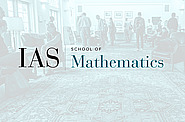2020-21 Seminars
Nov
18
2020
Nov
17
2020
Computer Science/Discrete Mathematics Seminar II
Factorization through L2, Rounding and Duality
10:30am|Simonyi Hall 101 and Remote Access - see Zoom link below
Nov
16
2020
Computer Science/Discrete Mathematics Seminar I
Indistinguishability Obfuscation from Well-Founded Assumptions
Huijia (Rachel) Lin
11:15am|Simonyi Hall 101 and Remote Access - see Zoom link below
Nov
11
2020
Nov
10
2020
Computer Science/Discrete Mathematics Seminar II
Modular zeros in the character table of the symmetric group
10:30am|Remote Access Only - see link below
Nov
09
2020
Computer Science/Discrete Mathematics Seminar I
Associativity testing
Ben Green
11:15am|Simonyi Hall 101 and Remote Access - see Zoom link below
Nov
04
2020
Stability and Testability
Stability and sofic approximations for product groups and property (tau)
Adrian Ioana
11:00am|Remote Access
Nov
02
2020
Computer Science/Discrete Mathematics Seminar I
Anti-concentration and the Gap-Hamming problem
11:15am|Simonyi Hall 101 and Remote Access - see Zoom link below
Oct
28
2020
